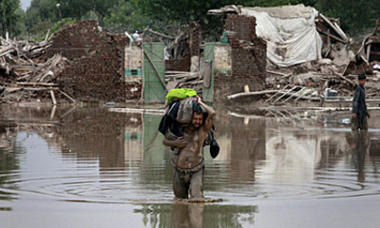 The worst floods in memory in Pakistan have affected more than 3 million people so far and the death toll has climbed over 1,500, a spokesman for the U.N. Children’s Fund said on Tuesday.
The worst floods in memory in Pakistan have affected more than 3 million people so far and the death toll has climbed over 1,500, a spokesman for the U.N. Children’s Fund said on Tuesday.
Abdul Sami Malik said 1.3 million people were severely affected by the floods in the northwest, triggering heavy criticism of the government over its response to the disaster.
Pakistani authorities are struggling to help victims of the flooding, many of whom have lost their homes and livelihood and say they had not received any official warnings that raging waters were heading their way.
Malik said aid agencies and Pakistani government officials will meet on Tuesday to determine whether to make an urgent international appeal for help.
Islamist charities, some with suspected ties to militants, have stepped in to provide help, piling pressure on the government to show it can take control of the crisis.
They played a key role in the relief effort following a 2005 earthquake in Kashmir that killed 75,000 people.
Pakistan’s government faces Taliban insurgents who have proven resilient despite a series of offensives the army said had weakened them.
Authorities expect the death toll to rise, with forecasts of more of the heavy monsoon rains that have been lashing the area for the past week. Pakistan’s National Disaster Management Authority said more than 29,500 houses were damaged and a key trade highway to China was blocked by flooding.
President Asif Ali Zardari’s government is already unpopular over widespread allegations of corruption and its failure to tackle politically-explosive issues such as chronic power cuts.
Zaradri is currently in Europe on a state visit.
Waters have receded in some flooded areas. But Malik expressed concern that waters were spreading from the worst hit province of Khyber Pakhtunkhwa to Pakistan’s Punjab heartland, the major food-producing province, as well as the Sindh region.
“They are affected. What we have heard from Punjab is that 50,000 people have already been displaced and 200,000 people are being evacuated from Sindh,” he said.
“In case of further rain, they expect that out of 23 districts in Sindh 19 will be affected.”
Officials said it was too early to estimate the damage the floods had caused to the economy, but the rains had so far spared the main agricultural heartland in the Punjab.
“The entire infrastructure we built in the last 50 years has been destroyed,” said Adnan Khan, spokesman for the provincial Disaster Management Authority in Khyber-Pakhtunkhwa.
(Reporting by Michael Georgy, editing by Jonathan Thatcher)




